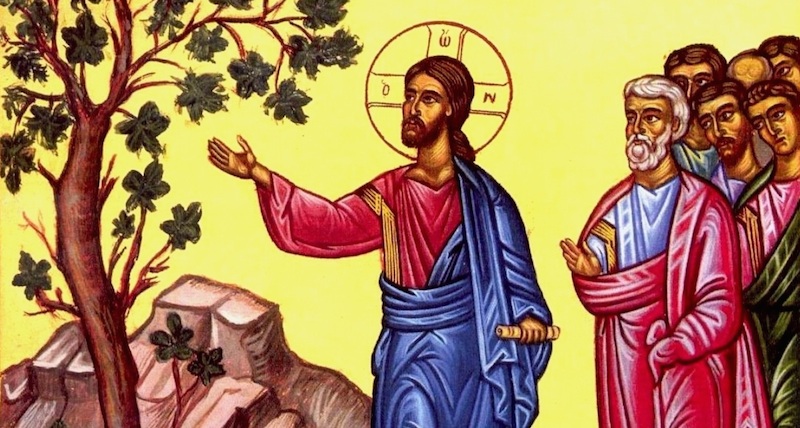Pray He finds figs

If you’ve ever had the chance to speak about the Christian faith with a Muslim, chances are that you will have heard the following objection raised to the divinity of Jesus (whom they call “Isa”):
“Does God know everything? Of course He does! If so, why did Isa (Jesus) not know when you can get figs? In Mark’s Gospel he goes to a fig tree looking for fruit, but he didn’t even know they weren’t in season! Isa therefore cannot be God”
If you’re a Christian who knows his faith, it’s tempting to laugh at such an objection and ignore it. However, today I would like to respond to this argument. I would like to do this for two reasons. Firstly, Scripture commands us to “be ready to give an answer” (1 Peter 3:15). Secondly, I think that the Biblical text being referred to here is really interesting and one upon which we would do well to meditate.

Jesus and the fig tree (Round 1)
Let’s begin by looking at the Scripture referred to in this argument:
On the following day, when they came from Bethany, [Jesus] was hungry. And seeing in the distance a fig tree in leaf, he went to see if he could find anything on it. When he came to it, he found nothing but leaves, for it was not the season for figs. And he said to it, “May no one ever eat fruit from you again.” And his disciples heard it. – Mark 11:12-14
If we accepted the Muslim argument outlined at the beginning of this post, we would understand this passage to simply describe Jesus wanting some figs, not finding any and then getting angry…at a tree. Not only does this seem amazingly petty for a great prophet of Allah, one wonders how someone who grew up in Israel could be so ignorant of the season for figs.
Jesus and the fig tree (Round 2)
We’ll come back to this a little later in the article…
Jesus and the fig tree (Round 3)
A little later in Mark’s Gospel the subject of the fig tree comes up again:
As they passed by in the morning, they saw the fig tree withered away to its roots. And Peter remembered and said to him, “Master, look! The fig tree which you cursed has withered.” – Mark 11:20-21
There’s not much to say here except that we see Jesus’ curse resulted in the tree dying. The Muslim apologist will concede that Jesus had great power, enough to vanquish a fig tree with a word. Nevertheless, in the first passage he demonstrates ignorance which surely must prove that Jesus could not be God.
However, you will notice that I’ve titled this section as “Round 3” of Jesus and the fig tree. Why “Round 3”? Well, you see, between the two Scripture passages we have an important incident in which Jesus goes into Jerusalem. This is a technique which Mark uses a lot, sandwiching one story inside another to drive home a point. The technical word for this is “intercalation”, but you’ll often hear people affectionately refer to it as a “Marken Sandwich”. So, with that in mind, let’s take a look at the intervening text…
Jesus and the fig tree (Round 2)
The text we skipped over is as follows:
And [Jesus and His disciples] came to Jerusalem. And he entered the temple and began to drive out those who sold and those who bought in the temple, and he overturned the tables of the money-changers and the seats of those who sold pigeons... And he taught, and said to them, “Is it not written, ‘My house shall be called a house of prayer for all the nations’? But you have made it a den of robbers.” … And when evening came they went out of the city. – Mark 11:15-19
With this additional passage we get a complete picture of the events. Jesus and his disciples travel from Bethany into Jerusalem and, along the way, Jesus curses the fig tree. Jesus then causes a ruckus in the Temple and they return to Bethany. On their way into Jerusalem the following day, they notice the tree that the tree has died.
Analyzing & applying the sandwich
 So, what do the events in the Temple tell us about the fig tree? Well, here we have Jesus coming to the very epicenter of Judaism, the focal point of the nation and the place of worship and sacrifice…and denouncing it. Jesus gave them a spot inspection and they failed. In place of piety he found greed and in place of charity he found corruption.
So, what do the events in the Temple tell us about the fig tree? Well, here we have Jesus coming to the very epicenter of Judaism, the focal point of the nation and the place of worship and sacrifice…and denouncing it. Jesus gave them a spot inspection and they failed. In place of piety he found greed and in place of charity he found corruption.
How might this relate to the incident with the fig tree. Well, it first helps to know what the fig tree symbolized to the Jewish people. In the prophets, again and again we find horticultural imagery used to represent Israel and God berates them for their lack of fruit, their lack of piety and charity.
With this background we can now put everything together. Through the prophets, God had said He would come and visit His people and His Temple at a time they would not expect. This is what Christ did and, in the words of the Book of Daniel, it was “weighed, measured and found wanting…” (Daniel 5:24-28). This is symbolically played out in the events of the fig tree. Jesus went to the fig tree (Israel) at an unexpected time (out of season) and judged it. Jesus knew perfectly well that it wasn’t the season for figs, He was symbolically prefiguring what was about to take place in the Temple. Far from disproving His divinity, it demonstrates it!
What are we to learn from these events of Scripture? Primarily, I think the moral sense of this passage teaches us about vigilance. We should always be ready to be inspected by the Lord, both in and out of season. Anagogically, we are reminded that we will, one day, meet the Lord at an unexpected hour. Either He will come back to us, or we will go to meet Him. Will He find good fruit?